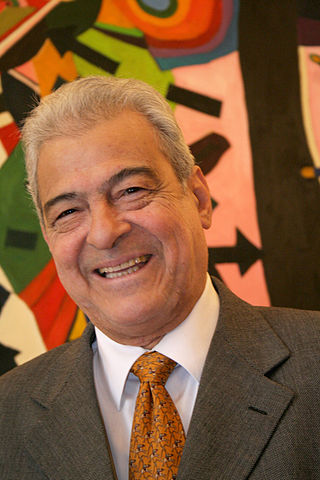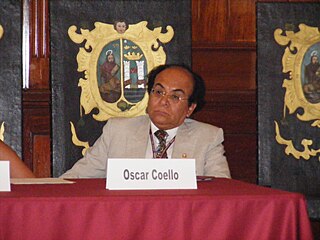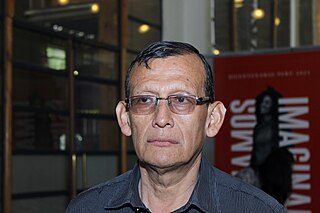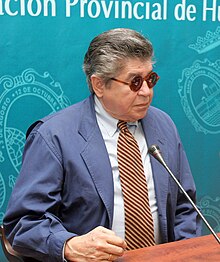Literary career
Throughout Europe
Between 1965 and 1966 he subsequently lived in Peruggia, Mykonos and Germany, where he moved to study German thanks to a grant from the Goethe-Institut.
Back in France, recognition and PhD in Peru
Bryce returned to France and taught Spanish in a school at Le Maurais from 1967 to 1968. This year, he published his first book Huerto Cerrado and the next year became a lecturer of Latin American literature at Paris Nanterre University and since 1971 at the Sorbonne. In 1970 he had been published A World for Julius .
In 1972 he was awarded the Peruvian National Prize for Literature and in 1973 he entered as an assistant lecturer to the University of Vincennes (Paris VIII). A few years later in 1975, Bryce received a Guggenheim grant and obtained a master's degree in comparative literature from Vincennes. In 1977, he returned to Peru and received his doctoral degree from San Marcos University with a thesis on Henry de Montherlant.
Career in Spain
In 1984, Bryce settled down in Spain living first in Barcelona and since 1989 in Madrid. In 1997, he returned to Peru, where he currently lives.
His first book Huerto Cerrado published in 1968, was a finalist for the Casa de las Américas literary prize awarded in Cuba and is a collection of short stories written in different styles and points of view about a young protagonist, Manolo, a member of Lima's upper class, as he comes of age in 1950s Lima. This was followed by his first novel, Un Mundo para Julius, published in 1970 that became a big success and counts today as one of the classics of Latin American literature. The novel, which has since been translated into ten languages, tells the story of a young boy who grows up as the youngest of four children of a rich, Peruvian upper-class family. Although Julius actually belongs to the ruling classes he feels a stronger bond with the servants which surround him and this brings him into conflict with his family. With biting irony the author exposes, through the eyes of a child, the great social differences in Peruvian society.
Recent successes
Un mundo para Julius marks for Bryce Echenique the start of an extremely productive literary career, in which he has until today written nearly twenty novels and story volumes.
"I am an author of the second half of the 20th century." Despite this declaration and his spatial and temporal closeness to other Latin American authors of the boom generation, Bryce Echenique keeps a conscious distance from his colleagues who he sometimes refers to as "nouveau riche". That his style, as one critic once said, corresponds more to an ironic than a magic realism, is also shown by the author in one of his latest novels: La amigdalitis de Tarzán from 1999. Largely in the form of letters, the novel relates the story of the hindered romantic relationship between a poor Peruvian troubadour and the daughter of an influential Salvadoran family.
Similar to his heroes, Alfredo Bryce Echenique also lived for decades far from his home city of Lima to which he only returned in 1999. Also that year he was granted an honorary degree by the Universidad Nacional Mayor de San Marcos.
Claims of plagiarism
In March, 2007, Peruvian Diplomat Oswaldo de Rivero wrote an article for the newspaper El Comercio of Lima, Peru accusing Bryce of writing an article "Potencias sin poder" that was an almost exact copy of one written by de Rivero in the magazine "Quehacer" in March, 2005. Bryce responded saying the article had been submitted in error by his secretary.
Juan Carlos Bondy subsequently found evidence that Bryce had earlier plagiarized the article "Amistad, bendito tesoro" by Ángel Esteban that had appeared in La Nación of Argentina in December, 1996. Bryce has also been accused of plagiarizing articles by Graham E. Fuller and Herbert Morote. [2]
Journalism professor María Soledad de la Cerda found sixteen other instances of plagiarism which were found as a result of research for her course in investigative journalism. [3]

Jorge Mario Pedro Vargas Llosa, 1st Marquess of Vargas Llosa, more commonly known as Mario Vargas Llosa, is a Peruvian novelist, journalist, essayist and former politician. Vargas Llosa is one of Latin America's most significant novelists and essayists and one of the leading writers of his generation. Some critics consider him to have had a larger international impact and worldwide audience than any other writer of the Latin American Boom. In 2010, he won the Nobel Prize in Literature, "for his cartography of structures of power and his trenchant images of the individual's resistance, revolt, and defeat." He also won the 1967 Rómulo Gallegos Prize, the 1986 Prince of Asturias Award, the 1994 Miguel de Cervantes Prize, the 1995 Jerusalem Prize, the 2012 Carlos Fuentes International Prize, and the 2018 Pablo Neruda Order of Artistic and Cultural Merit. In 2021, he was elected to the Académie française.
Peruvian culture is the gradual blending of Amerindian cultures with European and Asian ethnic groups. The ethnic diversity and rugged geography of Peru allowed diverse traditions and customs to co-exist. Peruvian culture has been deeply influenced by Native culture, Spanish culture, and Asian culture. Other minor influences on their culture are Chinese, Japanese, and other European peoples.
Julio Ramón Ribeyro Zúñiga was a Peruvian writer best known for his short stories. He was also successful in other genres: novel, essay, theater, diary and aphorism. In the year of his death, he was awarded the US$100,000 Premio Juan Rulfo de literatura latinoamericana y del Caribe. His work has been translated into numerous languages, including English.

Alonso Cueto Caballero is a Peruvian author, university professor and newspaper columnist.

Latin American literature consists of the oral and written literature of Latin America in several languages, particularly in Spanish, Portuguese, and the indigenous languages of Latin America. This article is only about Latin American literature from countries where Spanish is the native/official language. Even though these 18 countries share a language, each one has its unique literary traditions although they often overlap with those of other countries. Here only the most general literary trends are discussed. Latin American literature rose to particular prominence globally during the second half of the 20th century, largely due to the international success of the style known as magical realism. As such, the region's literature is often associated solely with this style, with the 20th century literary movement known as Latin American Boom, and with its most famous exponent, Gabriel García Márquez. Latin American literature has a rich and complex tradition of literary production that dates back many centuries.
The term Peruvian literature not only refers to literature produced in the independent Republic of Peru, but also to literature produced in the Viceroyalty of Peru during the country's colonial period, and to oral artistic forms created by diverse ethnic groups that existed in the area during the prehispanic period, such as the Quechua, the Aymara and the Chanka South American native groups.
The Premio Planeta de Novela is a Spanish literary prize, awarded since 1952 by the Spanish publisher Grupo Planeta to an original unpublished novel written in Spanish. It is one of about 16 literary prizes given by Planeta.

Antonio Alfonso Cisneros Campoy was a Peruvian poet, journalist and academic. He was born in Lima on 27 December 1942 and died there of lung cancer on 6 October 2012, aged 69.

Oscar Coello, is a Peruvian poet, professor and literary critic. He holds the chairs of American literature, and rhythm at the National University of San Marcos in Lima.
Huerto Cerrado is a collection of short stories written by Peruvian author Alfredo Bryce Echenique. Published in 1968, it was Bryce's debut in the literary world and won him special mention in the Casa de las Américas Prize of that year. The stories form a basis for the development of his later novel, Un mundo para Julius, published in 1970.

Santiago Rafael Roncagliolo Lohmann is a Peruvian writer, screenwriter, translator and journalist. He has written five novels about fear. He is also author of a trilogy of non-fiction books on Latin America during the twentieth century.

Angelina Muñiz-Huberman is a Mexican writer, academic, poet and professor. She is known for her work and research on Ladino, crypto-Judaism, Jewish mysticism and Sephardic Jews. Muñiz-Huberman is a recipient of the Xavier Villaurrutia Award and the Sor Juana Inés de la Cruz Prize. In 2022, she received an honorary doctorate from the National Autonomous University of Mexico (UNAM) for a lifetime's work, an honor she shares with such figures as John Dewey, Octavio Paz and Juan Rulfo.
The National Literature Prize for Narrative is a prize awarded by Spain's Ministry of Culture for a novel written by a Spanish author in any of the languages of Spain. The prize is 20,000 euros.
A World for Julius, is the first novel published by the Peruvian writer Alfredo Bryce. In this postmodern novel, Bryce incisively charts the decline of an influential, centuries-old aristocratic family faced with the invasion of foreign capital in the 1950s.
César Calvo Soriano was a Peruvian poet, journalist, and author. Calvo was part of the "Generación del Sesenta", a group of prominent Peruvian poets that came of age in the 1960s. Considered an important voice in the literature of Peru and the Amazon basin, his work has been celebrated in Latin America and a novel translated into Italian and English.

Juan Carlos Méndez Guédez is a Venezuelan writer. From an early age, he and his family moved to Caracas, where he lived in the popular area of Los Jardines del Valle, but always kept a close connection with his native hometown. He earned a Bachelor of Arts from the Central University of Venezuela with a thesis on poetry groups "Traffic" and "Guaire". Later, he earned a Ph.D. in Hispanic American Literature from the University of Salamanca with a thesis on the Venezuelan writer José Balza.
Tarzan's Tonsillitis is an epistolary novel from the Peruvian writer Alfredo Bryce.

Pablo Landeo Muñoz is a Peruvian writer, translator and teacher of language and literature. His literary works are written in Quechua and Spanish.
Leandra Josefa Victoria Tristán y Flores del Campo was the First Lady of Peru from 1851 to 1855, during her marriage to the President of Peru, José Rufino Echenique. The district of La Victoria in Lima was named in her honor.

A World for Julius is a 2021 drama film written, co-produced and directed by Rossana Díaz Costa. The film is based on the homonymous book by the author Alfredo Bryce Echenique.










